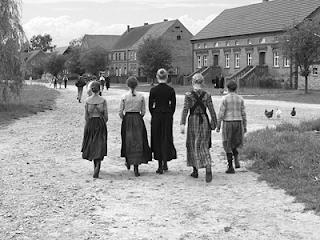The film, nominated for Academy Awards for Best Foreign Language Film and Cinematography, is set in 1913-14 in the village of Eichwald, Germany, where a series of seemingly random acts of violence threatens to topple the baronial and male hierarchy of the community. Told in flashback as the memories of the village’s schoolteacher (Ernst Jacobi as narrator, Christian Friedel on screen), The White Ribbon unfolds as a morality tale gone horribly wrong.
First, the local doctor is felled on his horse by a tripwire stretched across his garden entrance. Was he being punished for having a relationship with his midwife after the death of his wife, or was it for something darker and more disturbing? Then a farmer’s wife dies in an accident in the Baron’s sawmill. Soon, it is the children of Eichwald who become the targets of devastating attacks, beginning with the baron’s son. Are the other children somehow involved?
Haneke layers his film with deeper and more disturbing themes and situations, and it becomes apparent that the sins of the fathers (the doctor, the baron, his steward and the pastor) are being taken out upon their children, even as the pastor is meting out severe punishment to his own slightly creepy brood. He ties his eldest son’s arms to his bed when he fears the boy is masturbating and visits his harshest punishment onto his eldest daughter. The title of the film refers to white ribbons the pastor makes his children wear like scarlet letters, signifying the “purity” that eludes them.
The most disturbing scenes in The White Ribbon are not violence, but emotionally bruising scenes of the men in the village exerting their dominance over their women and children, most notably the doctor cruelly dismissing his lover, the midwife. Haneke seems to ask: Is it any wonder that this generation grew up to blindly follow Hitler and his perverse Pied Piper’s song?
The White Ribbon is a slow and methodical film that ends with many questions unanswered, but Haneke makes a compelling case that the misery, humiliation and hopelessness the people suffer in Eichwald made them eager for the deliverance that Hitler would promise a generation later.
UPDATE: The White Ribbon is now available on DVD
Review by Neil Cohen, resident film critic of Movie Dearest and Phoenix's Echo Magazine.















No comments:
Post a Comment